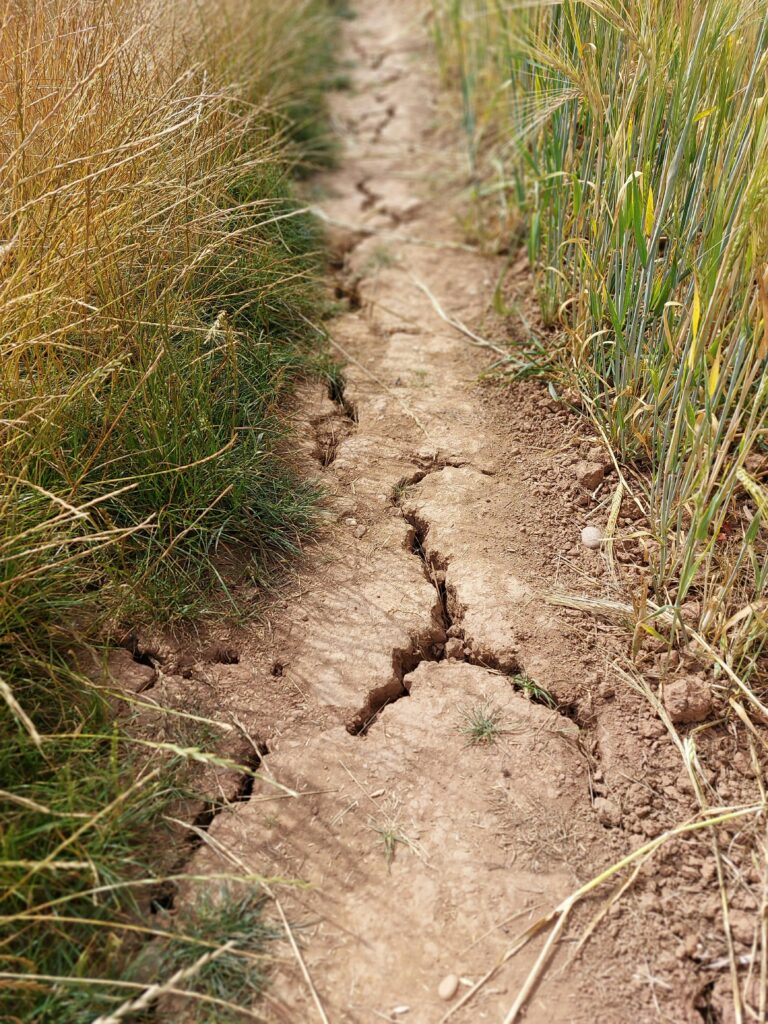Hutton scientists respond to the drought facing the UK
As UK agriculture copes with its driest spring in decades, researchers from The James Hutton Institute have written a report for the British Ecological Society (BES) detailing how their science is playing a pivotal role in helping the UK navigate this crisis and prepare for the next.
The UK is in the grip of one of its most severe droughts in living memory. Spring 2025 is officially the driest since 1956, and the consequences have impacts through many facets of the British agroecosystem, from parched farmlands to shrinking rivers.
Crops such as wheat, barley, and potatoes are already showing signs of stress, with yields expected to plummet due to dry soils and high temperatures.
Livestock farmers aren’t faring much better. Poor grass growth has meant a heavier reliance on expensive feed, squeezing already tight margins.
Professor Tim George, Director of the Hutton’s International Barley Hub (IBH) said, “The Hutton and its flagship initiatives, including the IBH, are delivering agricultural innovations such as the development of regenerative practices, nature-based solutions for water conservation and drought-resistant crops.
Such innovations, along with targeted subsidies from local and regional government aim to make agriculture more adaptable and less wasteful in the future.”
Hutton scientists see improving the drought tolerance of crops as a top priority. Through plant breeding projects, they are exploring a range of approaches, some traditional, some cutting edge, to understand how different varieties perform in specific regions (known as Genotype x Environment analysis). This allows scientists to tailor crops to local conditions. Some projects in the IBH involve farmers directly in the selection of the best-performing lines, a method known as participatory breeding.
“Climate resilience isn’t just about reacting to crises, it’s about anticipating them, adapting to them, and innovating beyond them. Whether it’s through smarter farming, better water management, or cutting-edge genetics, the path forward is clear, and science has a critical part to play in our future sustainability.”
Dr Tracy Valentine, The James Hutton Institute

Scientists are selecting varieties with traits like deeper roots and longer-lasting green foliage (“stay-green” traits). They are also turning to landraces, traditional crop varieties naturally adapted to dry conditions, for inspiration. Using advanced methods like marker-assisted selection and genomic selection scientists can predict drought tolerance using genetic data. Genome-wide association studies help pinpoint the exact genetic regions linked to drought resilience.
They are applying cutting edge approaches such as gene editing and precision breeding to tweak specific genes that control how plants respond to water stress, and remote sensing using drones and sensors to track plant health and fast-track the development of climate-resilient crops in field conditions.
Dr. Roy Neilson, Group Leader Plant Soil Interactions at the Hutton and member of the BES Scottish Policy Group, co-authored the recently published BES report on Regenerative Agriculture in the UK. He notes that adoption of regenerative agriculture principles is a potential adaptation strategy for farmers to build resilience against an ever-changing climate. For example, minimising bare soil and reducing tillage increases soil water holding capacity and water infiltration through improved soil structure. Moreover, use of cover crops, organic amendments, and intercropping can enhance soil water retention and reduce evaporation, saving water for the more efficient crops.
Dr Tracy Valentine, Research Leader, Plant:Soils Interaction at the Hutton, said, “Climate resilience isn’t just about reacting to crises, it’s about anticipating them, adapting to them, and innovating beyond them. Whether it’s through smarter farming, better water management, or cutting-edge genetics, the path forward is clear, and science has a critical part to play in our future sustainability.”
Drought isn’t just a farming issue. River flows in places have dipped to their lowest levels since records began in 1958, putting freshwater wildlife and habitats at serious risk. Eastern Scotland in particular is experiencing record-low groundwater levels, prompting emergency interventions like transporting water to remote communities. When rain does come the degraded soil status increases the risk of large-scale water run-off and flooding.
Wildfires, once rare in much of the UK, have surged in frequency and intensity. More land has already burned this year than in any previous full year. Climate scientists warn this may be the new normal.
Professor George said, “The next few weeks will be crucial. Without significant rainfall, the UK could formally enter a state of drought, triggering further restrictions. Looking further ahead, climate models suggest this won’t be a one-off. Droughts like this are likely to become more frequent, longer and more intense.”
